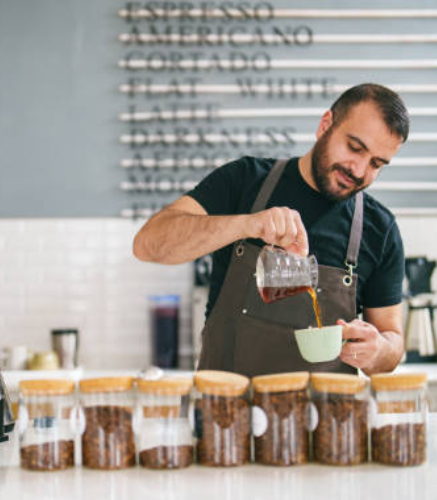What can you do about sour coffee?
Nothing is more frustrating than a cup of coffee that tastes sour, especially when you're looking forward to a delicious cup to start your day. Sour coffee can really ruin your coffee moment, but fortunately there are several steps you can take to address this problem. In this blog, we discuss what causes sour coffee and, more importantly, what you can do to prevent it.
Why is my coffee sour?
Sour coffee is usually caused by incorrect brewing methods, incorrect coffee grinding, or poor-quality coffee beans. Acids are naturally present in coffee, and although they can add to the complexity of the flavor, you don't want them to dominate.
Here are some common causes of sour coffee:
- Too coarse grind: If your coffee is ground too coarsely, the water will flow through the coffee more quickly, resulting in insufficient extraction and a sour flavor.
- Water temperature too low: Coffee brewed with water that is too cold can have a sour taste because the flavours are not fully extracted.
- Poor quality or overly fresh coffee beans: Insufficiently roasted or overly fresh beans contain more acidic notes that can manifest themselves in your coffee.
- Brewing time too short: If you don't let the coffee brew long enough, the acids can become more pronounced in your cup.

What can I do about sour coffee?
What can I do about sour coffee?
1. Adjust the grind size
One of the most important factors in sour coffee is the grind size of your coffee beans. If you find that your coffee tastes sour, try grinding it a little finer. A finer grind increases the extraction time, allowing more flavors (and less acidity) to be extracted from the coffee. Make sure your grind isn't too fine, as this can lead to bitter coffee.
2. Increase the water temperature
The water temperature is crucial for good coffee extraction. Make sure your water is between 90°C and 96°C. If the water is too cold, the flavours will not be released properly, resulting in sour coffee. Use a thermometer or a kettle with adjustable temperature to measure the temperature accurately.
3. Extend the brewing time
If you find that your coffee tastes sour, it may be because the extraction time was too short. Extend the brewing time to get more flavour from the coffee beans. This applies in particular to methods such as French press or pour-over. Experiment with a longer brewing time until you achieve a balanced flavour.
4. Check the quality of your beans
Sour coffee can also be caused by the quality of the coffee beans. Choose beans from a reputable roaster and pay attention to the roast. Medium to dark roasted beans tend to have less acidic notes than light roasted beans. Also, make sure your coffee beans are not too fresh; beans that have just been roasted sometimes need time to fully develop their flavours.
5. Try a different brewing method
Some brewing methods, such as espresso or cold brew, are less prone to acidic flavors than filter coffee, for example. If you often find coffee too acidic, consider trying a different brewing method that better suits your taste preferences.

No more sour coffee
Sour coffee is a common problem, but fortunately there are plenty of ways to prevent and remedy it. By adjusting the grind size, increasing the water temperature, extending the brewing time and checking the quality of your beans, you can minimize the sour taste and enjoy a delicious cup of coffee.
Experiment with these tips to find the perfect balance and enjoy flavorful, non-sour coffee from now on.
Read our blogs
In addition to these interesting blogs about various ways of making coffee, there are also other blogs on our website that you can read. If you would like to take a look at that page, click here.
